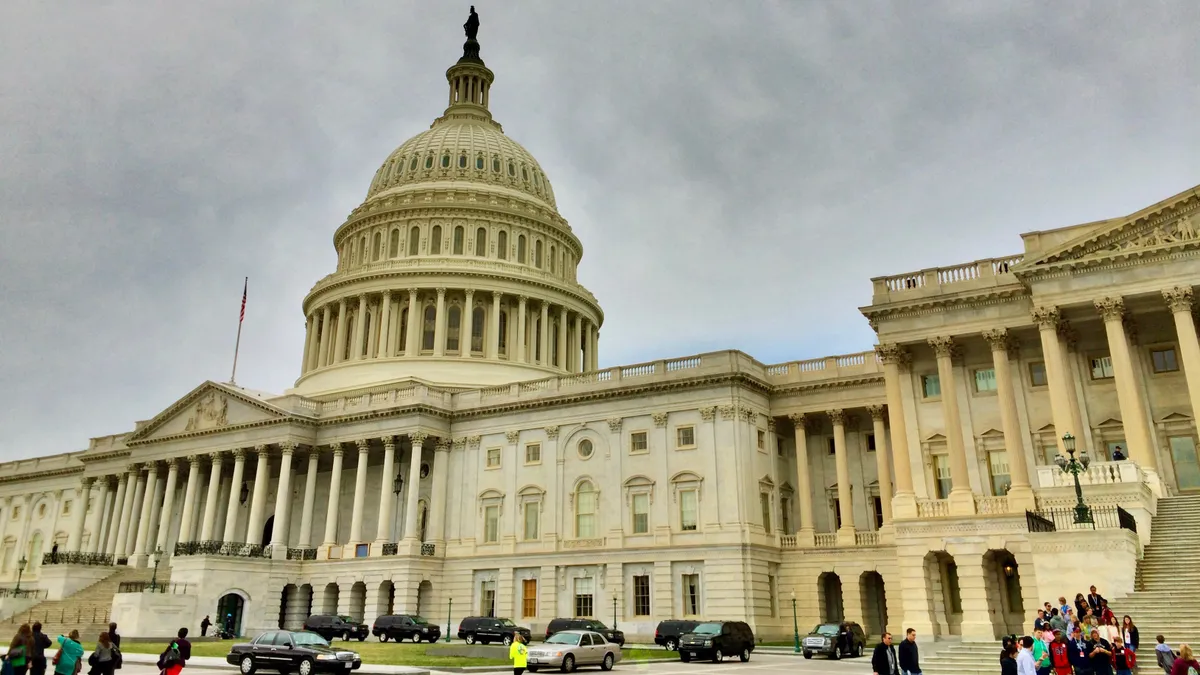Dive Brief:
- A coalition of more than 100 environmental groups, recyclers, public health advocates and others are adding their voices to a growing effort calling on Congress to prioritize recycling funding in any future pandemic relief legislation. Led by the U.S. Public Interest Research Group (PIRG), the coalition includes nonprofit recyclers Eureka Recycling from Minnesota, as well as Eco-Cycle from Colorado and the Ecology Center from California.
- A May 29 letter, shared with Waste Dive, emphasized the need to reduce plastic pollution and ensure steep financial losses associated with the pandemic don't accelerate a crisis for recyclers because "nobody wins when we lose local recycling programs." The group recommends Congress pass the Break Free From Plastic Pollution Act, which it states "would reduce waste and help local recyclers."
- A separate coalition of plastics groups and other recycling industry stakeholders previously asked Congress to pass a version of the infrastructure-focused RECOVER Act with $1 billion in matching funds. The new PIRG-led effort opposes RECOVER "as written," stating "such funds could be used to promote dangerous, unproven, and thriftless technologies that would encourage more single-use plastic production at taxpayers’ expense."
Dive Insight:
Stalled momentum around recycling and waste reduction legislation is seeing a revival as some groups seek to attach previously-introduced bills to larger aid packages. While the new letter does not directly call for the Break Free From Plastic Pollution Act to be included in a relief bill, it does serve to highlight some of the bigger divisions that already existed around several recycling bills before the pandemic ramped up in the United States.
Environmental groups have long been enthusiastic about the Break Free From Plastic Pollution Act, which focuses heavily on product stewardship regulations, plastic reduction and a national container deposit system. Those proponents now argue the pandemic's impacts on recycling have heightened the need for the bill's measures.
"Our communities’ recycling programs need immediate support to sustain programs that protect our environment and supply recycled materials," the letter states, while arguing that RECOVER would not help address underlying supply chain issues.
The new push comes after a prior April 16 letter to Congress concerning RECOVER, backed by a coalition including the American Chemistry Council (ACC), the Association of Plastics Recyclers and the Plastics Industry Association that critics dismissed as a "bailout" for plastics companies. The Solid Waste Association of North America (SWANA) was also a signatory, along with The Recycling Partnership (TRP) and the Glass Packaging Institute.
That coalition called for RECOVER's inclusion in a future infrastructure relief package, while doubling the bill's original dollar amount. Proponents of the measure told Waste Dive that cost increase accounts for research done by TRP, which found nearly $10 billion would be needed to address and improve U.S. recycling infrastructure.
Alex Truelove, director of the Zero Waste Program for U.S. PIRG, told Waste Dive the new letter sent Friday "responds" to that RECOVER request and gives an idea "about how we would rather see industry and funding models moving forward" as pandemic recovery efforts continue.
In a press release, U.S. PIRG said the RECOVER Act "would invest up to $1 billion in infrastructure over the next five years, including facilities that convert plastic to fossil fuels and produce harmful feedstocks." By contrast, the group stated the Break Free From Plastic Pollution Act would help recyclers while also seeking to shift away from plastics manufacturing, a process largely intertwined with fossil fuels.
ACC did not respond to a request for comment about the new letter prior to publishing time. Earlier this year, ACC said plastic makers are committed to ending plastic waste but that new product bans would hurt domestic growth. Keith Christman, ACC's managing director of plastics markets, echoed that sentiment to lawmakers in March.
Many in the waste industry have also been wary of the coalition-backed bill. The National Waste and Recycling Association declined to comment on the new letter to Waste Dive, but has previously opposed the Break Free From Plastic Pollution Act.
"We can achieve the same end of reducing plastic waste pollution by encouraging more recycled content in the manufacturing of plastic products, improving products through better consumer product and product packaging designs, and by providing tax and other incentives to promote the development of new domestic markets and increased domestic recycling capacity,” said CEO Darrell Smith in a statement last year, which noted NWRA supports RECOVER.
Other efforts to help the industry recover from the pandemic are also advancing or seeing a major push by stakeholders. Last week, NWRA-backed legislation to increase spending flexibility within the CARES Act's Paycheck Protection Program (PPP) debuted in the House of Representatives. SWANA and others including NWRA are meanwhile pushing relief for local governments, from Congress as well as from the Federal Emergency Management Agency.










